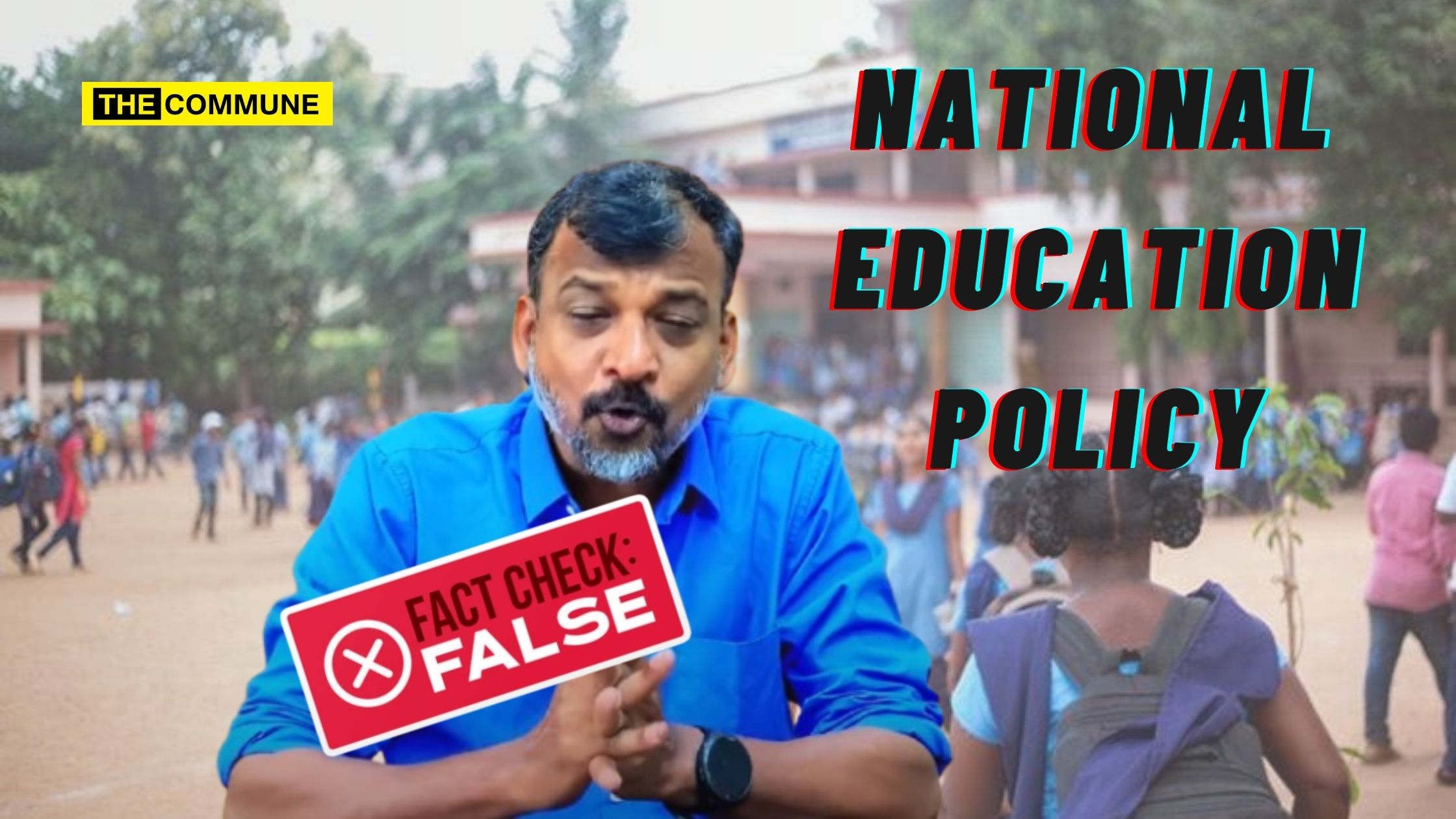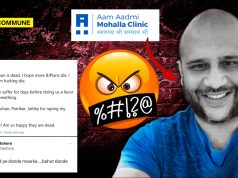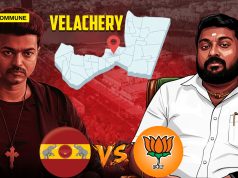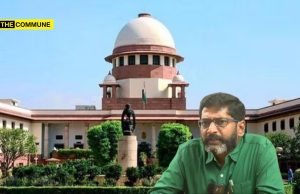
For the past three days, the DMK and its ally parties, along with Dravidianist media, have been relentlessly pushing the narrative that the Central Government is imposing “Hindi” on the state. However, the Tamil Nadu BJP chief attempted to clarify that the Central Government’s intention was to introduce a third language, not to force Hindi. Despite this, the same narrative was being repeated and amplified by various stakeholders of the Dravidianist ecosystem. Annamalai, in turn, began exposing the hypocrisy of the DMK and its allies, pointing out that many of their schools already teach Hindi, even as they opposed the idea of a third language. This revelation shifted the conversation, and people at the grassroots level began to realize that the 3 language policy was being implemented in private schools run by Dravidianist politics while kids from government school students have been deprived of the opportunity.
Once this hypocrisy was exposed, the DMK fell silent, with their leaders being questioned about their contradictions during press conferences.
It is in this context that former IAS officer Israel Jebasingh, who also runs an IAS academy, has put a video which seems like an attempt to buttress the ruling DMK with fabricated points and half-truths to defend their stance. Instead of directly quoting or discussing the NEP 2020, he avoided the actual policy altogether, knowing he would be exposed. Instead, he resorted to spinning baseless stories in a desperate attempt to reinforce the DMK’s narrative in a brief 20-minute video.
In his entire video, Israel Jebasingh just sees only the “morning breakfast scheme,” as a positive aspect in the entire NEP 2020, which too he attributes to the DMK government. However, this narrative has already been debunked, as the DMK simply implemented what the NEP suggests.
Misinformation Peddled By Israel Jebasingh About Language Policy In Other Countries
Regarding the three-language policy, Israel Jebasingh, a former IAS officer, simply opposes it. He argues that countries like China, the USA, Germany, and Israel do not have such a policy, and therefore, India does not need one either was his first argument.
And about Germany or Israel following only 2 language policy, Mr. Israel Jebasingh is wrong. He has confidently peddled half-truths thinking that his viewers and students would take it as gospel truth. However, here are some facts about the language policy in some of the countries he mentions.
In Germany, German is the primary language of instruction in most schools. English or French is typically introduced as a compulsory subject in primary or early secondary education. In Gymnasium (academic secondary schools), students are generally required to learn a second foreign language, which can be French, Spanish, Latin, or another language. This is usually mandatory until at least Grade 10. So, Germany in effect follows a 3 language policy.
Same is the case with France where students have the opportunity to learn three languages – French and two other foreign languages.
Israel’s language policy emphasizes multilingual education, with Hebrew as the primary language in Jewish schools and Arabic in Arab and Druze schools, while some bilingual schools teach both. English is mandatory from Grade 3 or 4, becoming a core subject in middle and high school, with standardized exams like the Bagrut. Many schools also offer a second foreign language in high school, such as French, Russian, Spanish, German, or Yiddish, while some Jewish schools make Arabic compulsory to promote cross-cultural communication. This structured approach ensures linguistic diversity, global competitiveness, and national integration, similar to India’s proposed Three-Language Policy under NEP 2020.
Comparing Apples And Oranges
His argument reaches a new level of absurdity when he claims that the preface of the NEP document states its goal is to transform India into a $10 trillion economy. To support this, Jebasingh cleverly points to the USA and China, highlighting that they have only two official languages and still became economic powerhouses.
His argument reaches new heights of absurdity when he quotes the preamble of the NEP document, claiming its goal is to make India a $10 trillion economy. Jebasingh then shamelessly concludes that since the US and China only have two official languages, and yet they are economic powers, India should follow the same model.
If that is the case, China or for that matter USA does not have a multi-party democracy offering more political stability for development. Is it okay for Jebasingh if India replicates this model under the Modi government to achieve faster development like China or USA?
This kind of reasoning about economics is not only shocking, but it’s even more surprising coming from a former IAS officer. He seems to be treating the NEP document as nothing more than another language policy, speaking as if Tamil Nadu has already achieved everything there is to accomplish. How can that be true? He is either overlooking the real objectives of the policy or looking at the issue through a narrow, language-specific lens. The real objective of the NEP is not just introducing a third language; it also focuses on vocational education, skill development, self-sufficiency and an education system that is in tune with India’s needs for the future.
Yet, Jebasingh’s rhetoric appears to distort these true objectives, pushing a narrative that favors the DMK. This kind of thinking perpetuates a parochial mindset, which the NEP is specifically designed to eliminate. The goal of the policy is to empower future generations to make decisions based on what is best for India, rather than waiting for external forces, like China or the USA, to dictate changes. Unfortunately, individuals like Jebasingh, who cling to outdated views, spread misleading ideas that undermine this progress.
DMK Propagandist Mode
In the entire video, Israel Jebasingh was simply making misleading claims. For instance, he questioned his audience, asking, “Did Tamil Nadu lose anything by not implementing Hindi?” His answer will be perplexing. Jebasingh narrated that Tony Blair Foundation, a UK-based institution, recommended Africa follow Tamil Nadu’s model to eradicate poverty. This claim is not just illogical but outright laughable. What does Hindi or Tamil Nadu’s language policy have to do with Africa’s poverty alleviation strategies?
Upon reviewing available information, there is no evidence to support the claim that the Tony Blair Foundation has recommended African nations adopt Tamil Nadu’s model for poverty eradication. The Tony Blair Institute for Global Change has analyzed Tamil Nadu’s inclusive growth, particularly the role of political leadership and governance in the state’s development. This analysis does not constitute a recommendation for African countries to emulate Tamil Nadu’s approach.
However, this analysis does not constitute a recommendation for African countries to emulate Tamil Nadu’s approach. Therefore, the assertion that the Tony Blair Foundation has advised African nations to follow Tamil Nadu’s model lacks factual basis.
By making such claims, he deliberately shifts the focus away from the actual debate—whether Tamil Nadu benefits or loses by rejecting Hindi—and instead injects baseless narratives to reinforce Dravidianist propaganda. If Tamil Nadu’s supposed “anti-Hindi success story” were truly a model for the world, why do many of the state’s top politicians and their families enroll their children in CBSE schools that teach Hindi? This contradiction, much like Jebasingh’s statement, exposes the sheer hypocrisy behind such arguments.
To further support his argument, he cited the Human Development Index (HDI) and claimed Tamil Nadu and Kerala were top-ranking states, which is false.
According to 2022 data, Kerala has an HDI of 0.758 and ranks high, while Tamil Nadu is at 0.670, placing 14th, behind Maharashtra. Uttar Pradesh ranks 35th with an HDI of 0.596. If Jebasingh wanted to make a fair comparison, he should have compared Maharashtra to Tamil Nadu, as they have similar populations. Instead, he chose to compare Kerala, with a population of 34.6 million, to Tamil Nadu (72.1 million) and Uttar Pradesh (241 million). It’s clear he understands this, but his bias is evident as he pushes an agenda in favor of the DMK.
Former IAS Cadre Turns DMK Cadre
At one point, Jebasingh even shifted gears and openly aligned himself with the DMK, claiming the only purpose of the new education policy was to promote Hindi. He mentioned seeing an RTI online (posted by the DMK IT wing), which claimed there were no Tamil teachers in Kendriya Vidyalayas. This was nothing more than parroting the statements made by DMK MLAs in the media. In reality, there are advertisements for Tamil teacher recruitment in Kendriya Vidyalaya even as recent as February 2024, and many teachers have been working in these schools, which Jebasingh conveniently ignored to push his false narrative. Many students in Tamil Nadu who have studied in Kendriya Vidyalaya have vouched that students have the option to choose a third language – Tamil or German. So, this is yet another false propaganda of the DMK parroted by Jebasingh.
Israel Jebasingh also thinks that bringing Telugu, Malayalam, Kannada teachers to Tamil Nadu to teach the respective language is totally unnecessary. The fact that such statements are coming from a former IAS officer who should be promoting national integration is shocking.
He then goes on to say that one can learn functional sentences in any language they want in a span of 10-15 days. But not many will have access to linguistic experts or technology to learn languages in a jiffy. Why should a poor child of a government school be deprived of the opportunity to read and write Hindi or any other Indian language for free? How will someone who doesn’t know how to read and write Hindi figure out what’s the route written in a bus in Pune? It is a given that a Tamil candidate’s resume will standout even if he knows any other Indian language apart from Tamil and English.
Israel Jebasingh claims that Dr. APJ Abdul Kalam never studied Hindi but went on to become President of India. But what he didn’t say was APJ Abdul Kalam was fluent in several languages, including Tamil, English, Hindi, Urdu and French.
He then goes on to cite the Constitution of India saying that Hindi is not a national language but another official language like English. But the same Constitution under Article 351 says that it shall be the duty of the Union to promote the spread of the Hindi language so that it may serve as a medium of expression between different people of composite culture.
Rather than informing his audience about the true aims of the new education policy, Jebasingh spent his time spreading lies, weaving together illogical stories, and misleading his audience about the three-language policy.
The DMK and its Dravidianist supporters, like Israel Jebasingh, often bring up the 1963 anti-Hindi agitation, presenting it as a haunting chapter of history. They warn that if such a movement were to rise again, it would be a looming threat. However, what they fail to grasp is the context of that time. The 1963 movement was set against the backdrop of India’s recent independence, a time when the public’s anger towards British rule was still fresh and protest was their part of socio-political mileau. The DMK capitalized on this sentiment to oppose the Congress government, and the movement gained momentum rapidly.
He then resorts to fearmongering and incitement, claiming that if the Centre enforces the Three-Language Policy, it will trigger a protest a thousand times more intense than the Jallikattu agitation.
Inciting Separatism?
Jebasingh goes on to mention that after independence, Pakistan followed a 3 Language policy – mother tongue, which is Bengali in East Pakistan, Urdu for official communication between West & East Pakistan and English for global exposure. This he says paved the way for the creation of Bangladesh.
Is Jebasingh saying that implementing NEP would pave the way for a creation of separate Tamil Nadu?
Where Do Israel Jebasingh’s Kids Study?
To sit comfortably in air-conditioned rooms and claim that “people will not allow trilingualism” is not just chauvinistic but also highly arrogant. Jebasingh whose academy charges a minimum of ₹1.5 lakh per student can afford to put his kids in world-class CBSE or international schools where 3 language policy is implemented. Poor parents who have no choice but to put their kids in government schools do not have that privilege. They too deserve to receive an education on par with Jebasingh’s kids.
It is to be noted that all the south Indian states of Kerala, Andhra Pradesh, Telangana and Karnataka along with states like West Bengal, Odisha, Maharashtra, that takes pride in their language as much as Tamil Nadu does, follow the three language policy. Even in Tamil Nadu, most of the private CBSE and matriculation schools offer three languages till 8th grade. However, the political parties in Tamil Nadu – the DMK, AIADMK, VCK and others whip up unwarranted claims of Hindi/Sanskrit imposition.
While the NEP 2020 offers all children in public and private schools the opportunity to learn three languages of their choice, what the political parties and the Tamil Nadu government are doing is disadvantage government school children while the private school children continue to benefit from learning three languages. In essence they ‘impose’ the 2 language policy on underprivileged government school children saying “We will let you study only 2 languages in government schools. If you want to study a third language, you should join a private school”
Vallavaraayan is a political writer.
Subscribe to our channels on Telegram, WhatsApp, and Instagram and get the best stories of the day delivered to you personally.




